- Home
- André Aciman
Homo Irrealis Page 4
Homo Irrealis Read online
Page 4
Unlike excavation, which is vertical and moves down one layer at a time—sequentially—remanence is the pull of something that not only remains hidden, or that has gone underground and may be headed farther underground, or indeed that has altogether disappeared and may no longer exist and perhaps never did exist, but—to add a twist—whose converse, imminence, could just as easily be the pull of something that has not even come into being yet and is still working its way to the surface, into the future. The two gestures of emergence and disappearance happen coincidentally, for remanence and imminence are ultimately not about time, not about past, present, or future, but about the braiding of the three. It is about water that may or may not be underground, that may have dried up or that may be welling up, or both at the same time.
What continues to draw water dowsers is not necessarily the presence of something, nor, for that matter, its absence, but its echo, its shadow, its trace, or, conversely, its incipience, its inchoateness, its abeyance, its larval character. The shadow of the departed and the embryo of something yet unborn sit alongside each other. In the language of lithographers, Rome is both the city and its afterimage. It is both the image and the stains on the lithographer’s stone long after the prints have been framed and sold, the way fish scales might continue to glisten on the cutting board long after the fish has been sliced open, cooked, and eaten. Ultimately, Rome is less about time than the inflection of time, the perpetual reflux of time.
Being in Rome is part imagining and part remembering. Rome cannot die, because it never, ever really is. It is the shadow of something that almost was but stopped being but that continues to pulsate and craves to exist though its time either hasn’t come yet or is already gone, or is both coming and gone. Rome is pure fantasy. It is not quite there, not quite real, not unreal either, but irreal.
* * *
What Freud experienced vis-à-vis Rome happened to him again in 1904 when he was finally able to see the Acropolis in Athens. He experienced not disappointment, not even the overwhelming sensation called the Stendhal syndrome, where one is so taken before a great work of art that one collapses. What he felt instead was a cloying something verging on numbness, disjunction, and a sense of alienation. James Strachey’s translation of the German word Entfremdungsgefühl is derealization, the sense, in Freud’s own words, that “What I see here is not real.” What would have been a source of happiness and fulfillment turns into a form of near apathy, disbelief, and ultimately disturbance. The Acropolis does not speak to him. Nothing could signal his failure to consummate experience more than this inability to confront the real.
“So all this really does exist, just as we learned in school!” thinks a bewildered Freud as he stands for the first time in his life on the Acropolis. He knows that there was never any reason to doubt that the Parthenon existed, but he is nevertheless unable to grasp the reality of the experience of being there to prove its existence. It is as if the very mind that stopped itself short of indulging in “spinning [a] phantasy” is now doing the exact opposite and finds itself unable to indulge in reality either.
Visiting a place is not necessarily the experience of it. The real experience is the resonance, the “pre-image,” the afterimage, the interpretation of experience, the distortion of experience, the struggle to experience the experience. What we do when we think about experience, even when we don’t exactly know what to make of it, is itself already experience. It’s the radiance we project onto things and that things radiate back to us that constitutes experience. We bring our phantoms to Rome, and we uncover and read or expect to run into these phantasms, so that in the process Rome ultimately becomes the embodiment of these phantasms, even if we never run into them.
We remember best what could have happened but never happened.
* * *
What does Rome mean to Freud? Is it a stand-in for something else? Is it a jumble of unresolved memories, desires, fears, fantasies, traumas, blockages, repressions, et cetera, all bunched together from babyhood to adulthood, each not just layered on top of the other but existing—to use Freud’s apt word—alongside the other? Perhaps the question to ask is, how does Freud come up with the most brilliant metaphor in the history of psychology, stating that the psyche, like Rome, is not one thing, that identity itself is not one thing either, but a confluence of many movable and shifty, transient parts that trade places, change faces, don and doff all manner of masks, lie, cheat, steal from one to give to the other—which is why we don’t know who we are or what we want or why we can’t find forgiveness for sins we’re not even sure we’ve ever committed?
But still, why Rome? Perhaps Freud selects Rome because, in thinking about the eternal tussle between childhood impulses and their repression in adulthood, his mind must have drifted to Rome, but not just because Rome was a suitable metaphor for a man who was devoted to ancient art and archaeology, or because there was something about him and Rome that suggested repression, but because his very love of antiquity and archaeology was itself perhaps already a stand-in for his lifelong penchant for buried, shifty, undisclosed, primal, feral stuff, stuff that, in all likelihood, he had already harnessed and possibly censored by young adulthood. As Peter Gay suggests, not going to Rome was already perhaps an enduring form of censorship. Thinking of Rome in four or so pages of Civilization and Its Discontents was unsettling but not necessarily disturbing; it was maybe even pleasurable. Coming up with the idea of Rome as metaphor and toying with Rome’s many layers and thinking about layers and going through the motions of unpeeling layer after layer and delving deeper into things with near-clinical precision and dutiful historiographical details might possibly have been a safer and ultimately a secretly libidinous, surrogate pleasure for an unnamed pleasure being deferred.
In this sense, invoking Rome is not only a way of speaking about repressed impulses; it is an oblique way of discussing Freud’s own repression by presenting it as a figure of speech, a sort of universal metaphor. Archaeology, and by implication Rome itself, becomes both a mechanism and a metaphor of repression. Ultimately, the surest way of burying repressed material is by going through the motions of uncovering it. And vice versa.
Freud returned to Rome many times after 1901. Surely, he must have remembered each of his previous visits as he stood in his room at the Hotel Eden overlooking the city, thinking back, not just to a time when he couldn’t bring himself to visit Rome, but also ahead to the visits that had yet to come in years to follow. Being the methodical man he was, he would probably chart each visit in his mind, and, like Wordsworth recalling his visits to Yarrow, he too might try to make sense of a Rome unvisited, a Rome visited, and many Romes revisited—the boy Freud in Vienna reading up on Rome, the forty-something Freud arriving there, followed by the older Freud, then father Freud, sick Freud, each one forever eager to keep returning to a city that had come to symbolize so much of his passions and his life’s work.
As he keeps revisiting the church of San Pietro in Vincoli to see Michelangelo’s statue, he must at some point realize that his foremost yet seldom acknowledged inspiration for his lasting love of art, archaeology, and antiquity was not so much Hannibal but Winckelmann, the father of art history and archaeology, whom Goethe himself had read and who, without ever traveling to Greece, had devoted his life to studying not Greek statues but Roman replicas of Greek nudes. Yet Freud mentions Winckelmann only once. When wondering whether it was Hannibal or Winckelmann who had stirred his longing for Rome, he hastily offers a tortuous explanation justifying why the answer was Hannibal. Winckelmann he does not discuss. Yet Winckelmann’s love of the male body had produced a printed work second to none in the annals of art history. Freud does not mention this either. And even if he had Winckelmann’s tomes in mind, still, in the meantime, he had discovered the statue of Moses, and in thinking of Moses, he knew he was also obliquely thinking of himself. It was, in the end, easier to analyze Moses the man and Moses the statue than to analyze the analyst himself, easier too, and perhaps saf
er and—to use Freud’s own telling words—less “daring … to remain quiet” by analyzing a Jewish hero rather than naked Athenians. However, the language on Leonardo tells us that Freud was not insensitive to Athenian nudes. Thinking of Leonardo, Freud writes:
These pictures breathe a mysticism into the secret of which one dares not penetrate … The figures are again androgynous … they are pretty boys of feminine tenderness with feminine forms; they do not cast down their eyes but gaze mysteriously triumphant, as if they knew of a great happy issue concerning which one must remain quiet; the familiar fascinating smile leads us to infer that it is a love secret. (Italics added)
The analyst had found his double in the city itself—a city that was all layers, all tiers, and thus, essentially, bottomless. Freud fantasized about retiring to Rome and wrote to his wife in 1912 that “It feels quite natural to be in Rome; I have no sense of being a foreigner here.” He was echoing none other than Winckelmann himself, who came to love Rome and made Rome his home and who, once in Rome, wrote words that Freud had surely encountered, if not in Winckelmann, then most surely in Walter Pater’s assessment of Winckelmann: “One gets spoiled here; but God owed me this.”
IN FREUD’S SHADOW, PART 2
Freud would understand. I long for Rome, but there is always something unsettling, perhaps disturbingly unreal, about Rome. Very few of my memories of Rome are happy ones, and some of the things I wanted most from Rome, Rome just never gave me. These continue to hover over the city like the ghost of unfledged desires that forgot to die and stayed alive without me, despite me. Each Rome I’ve known seems to drift or burrow into the next, but none goes away. There’s the Rome I saw the first time, fifty years ago, the Rome I abandoned, the Rome I came looking for years later and couldn’t find, because Rome hadn’t waited for me, and I’d lost my chance. The Rome I visited with one person, then revisited with another and couldn’t begin to weigh the difference, the Rome still unvisited after so many years, the Rome I’m never quite done with, because, for all its imposing, ancient masonries, so much of it lies buried and out of sight, elusive, transient, and still unfinished, read: unbuilt. Rome the eternal landfill with never a rock bottom. Rome my collection of layers and tiers. The Rome I stare at once I open my hotel window and can’t believe is real. The Rome that never stops summoning me, then throws me back to wherever I’ve come from. I am all yours, it says, but I’ll never be yours. The Rome I forgo when it becomes too real, the Rome I let go of before it lets go of me. The Rome that has more of me in it than of Rome itself, because it isn’t really Rome I come looking for each time but me, just me, though I can’t do this unless I seek out Rome as well. The Rome I’ll take others to see, provided it’s mine we’ll visit, not theirs. The Rome I don’t want to believe could go on without me. Rome, the birthplace of a self I wished to be one day and should have been but never was and left behind and didn’t do a thing to nurse back to life again. The Rome I reach out for yet seldom touch, because I don’t know, and may never learn, how to reach out and touch.
Not a speck of me is Roman any longer, and yet once I’ve emptied my suitcase in Rome, I know that things are in their right place, that I have a center here, and that Rome is home. I have yet to discover that there are, so I’m told, about seven to nine ways to leave my apartment and head down the hill of the Gianicolo to Trastevere, but I am reluctant to learn shortcuts yet; I like the slight confusion that delays familiarity and lets me think I’m in a new place and that so many new things are open and possible. Perhaps what makes me happy these days is that I have no obligations, can afford to do whatever I please with my time, and I love spending my evenings sitting at Il Goccetto, where witty and smart Romans come to while away the hours before heading home for dinner. Some even change their minds while they’re drinking, as happened to me a few times, and end up having dinner right then and there. I like this Roman way of improvising dinner when all I’d planned for was a glass of wine. After wine, sometimes I’ll buy a bottle and head back to Trastevere to visit friends. On certain evenings, when I wish to go home, I avoid the bus and go up the hill on foot.
On my way across the Tiber at night I love to see the illuminated Castel Sant’Angelo with its pale ochre ramparts glowing in the dark, just as I love to see Saint Peter’s at night. I know that at some point I will reach the Fontanone and stop to stare at the city and at all of its glorious floodlit domes, which I know I will miss soon enough.
I love where I am staying. I have a balcony that overlooks the city. And when I’m lucky, a few friends will drop by, and we’ll drink while gazing out at the city by night like characters in a Fellini or Sorrentino film, wondering in silence perhaps what each of us still lacks in life or would want changed, or what keeps beckoning from across the other bank, though the one thing we wouldn’t change is being here. To paraphrase Winckelmann, Life owed me this. I’ve been owed this moment, this balcony, these friends, these drinks, this city for so long.
* * *
This could actually be my home. Home, says a writer I’ve read recently, is where you first put words to the world. Maybe. We all have ways of placing markers on our lives. The markers move sometimes, but some are anchored and stay forever. In my case, it’s not words, it’s where I touched another body, longed for another body, went home to my parents and, for the remainder of the evening and the rest of my life, would never banish that other body from my mind.
It was a Wednesday evening, and I was just coming back from a long walk after school. I used to like wandering about the center of the city in the late afternoon, arriving home just in time to do homework. Before taking the bus, I would frequently stop at a large remainders bookstore on Piazza di San Silvestro and, after riffling through a few books, seek out the one I had come for: a thick volume by Richard von Krafft-Ebing, Psychopathia Sexualis. There were several hardbound editions of it on sale in that bookstore, and by now I knew the ritual. I would pick one up, sit at a table, and sink into a prewar universe that was beyond anything I could ever imagine. The book was intended for medical professionals and was, as I discovered years later, intentionally obscure, with segments rendered in Latin to discourage lay readers, to say nothing of curious adolescents eager to navigate the uncharted, troubling ocean called sex. And yet as I pored over its arcane and detailed case studies on what was called inversion and sexual deviancy, I was transfixed by its wildly pornographic scenarios that turned out to be unbearably stirring precisely because they seemed so matter-of-fact, so ordinary, so unabashedly cleansed of moral stricture. The individuals concerned could not have seemed more proper, more urbane, more serenely well-behaved: the young man who loved to see his girlfriend and her sister spit in his glass of water before drinking it all up; the man who loved to watch his neighbor undress at night, knowing that the latter knew he was being watched; the timid girl who loved her father in ways she knew were wrong; the young man who stayed longer than he should in the public baths—I was each of them. Like someone who reads all twelve horoscopes in the back of a magazine, I identified with every sign of the zodiac.
After reading Krafft-Ebing’s case studies, I would eventually have to take the 85 bus for the long ride home, knowing that my mother would have dinner ready by the time I was back. Light-headed after so many case studies, I knew I’d eventually suffer from a migraine and that the incipient migraine, coupled with the long bus ride, might trigger nausea. At the bus station was a newspaper and magazine kiosk that also sold postcards. Before boarding the bus, I’d stare at the ones boasting statues, male and female, longingly, then buy one, adding some postcards of Roman vistas to conceal my purpose. The first card I bought was of the Apollo Sauroktonos. I still have it today.
One afternoon, after leaving the bookstore, I spotted a large crowd waiting for the 85 bus. It was cold and it had been raining, so once the bus arrived, we all massed into it as fast as we could, hurtling and jamming into one another, which is what one did in those days. I too pushed my way in, not realizing that the you
ng man right behind me was being pushed forward by those behind him. His body was pressed to mine, and though every part of him was glued to me and I was completely trapped by those around us, I was almost sure that he was pushing into me overtly and yet so seemingly unintentionally that when I felt him grab both of my upper arms with his hands, I did not struggle or move away but allowed my whole body to yield and sink into his. He could do with me whatever he wanted, and to make it easier for him, I leaned back into him, thinking at some point that perhaps all this was in my head, not his, and that mine was the guilty, unchaste soul, not his. There was nothing either of us could do. He didn’t seem to mind, and perhaps he sensed that I didn’t mind either, or perhaps he didn’t pay it any heed, the way I too wasn’t quite sure I did. What could be more natural in a crowded bus on a rainy evening in Italy? His way of holding my upper arms from behind me was a friendly gesture, the way a mountain climber might help another steady himself before moving farther up. With nothing else to hold on to, he had grabbed my arms. Nothing to it.
I had never known anything like this in my life.
Eventually, steadying himself a bit, he let go of me. But as the doors of the bus closed and the bus started to sway, he immediately grabbed on to me again, holding me by the waist, pushing even harder, though nobody around us could tell, and part of me was sure that he himself still couldn’t tell. All I knew was that he would let go of me once he’d steadied himself and could reach one of the grab bars. I could even tell he was struggling to let go of me, which is why I pretended to stagger away from him, only to lean back, as soon as the bus stopped, to prevent him from moving.

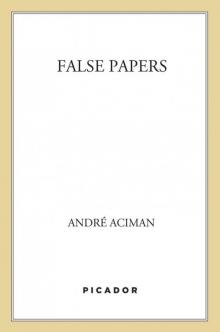 False Papers
False Papers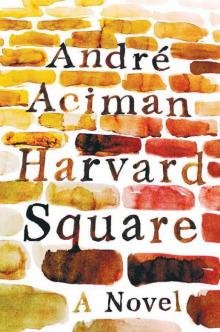 Harvard Square
Harvard Square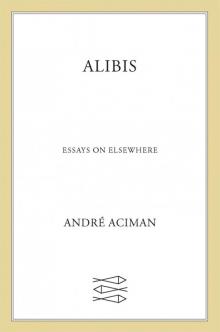 Alibis
Alibis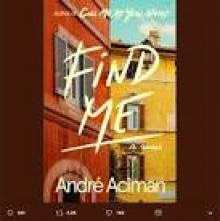 Find Me
Find Me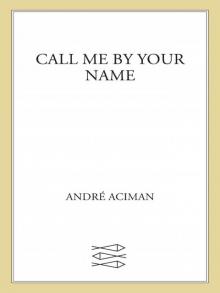 Call Me by Your Name
Call Me by Your Name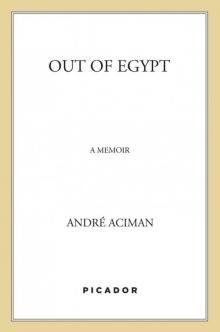 Out of Egypt: A Memoir
Out of Egypt: A Memoir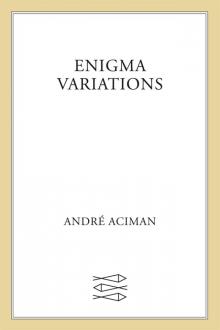 Enigma Variations
Enigma Variations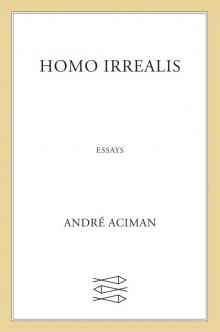 Homo Irrealis
Homo Irrealis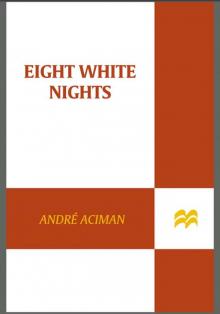 Eight White Nights
Eight White Nights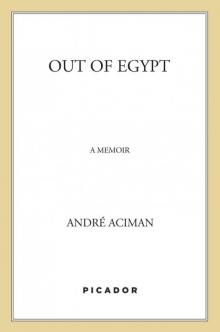 Out of Egypt
Out of Egypt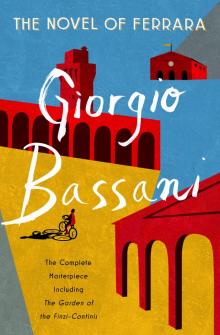 The Novel of Ferrara
The Novel of Ferrara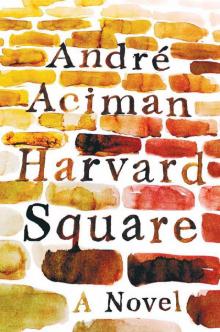 Harvard Square: A Novel
Harvard Square: A Novel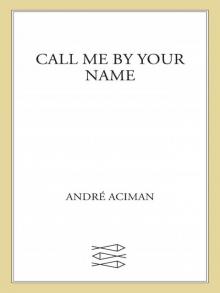 Call Me by Your Name: A Novel
Call Me by Your Name: A Novel